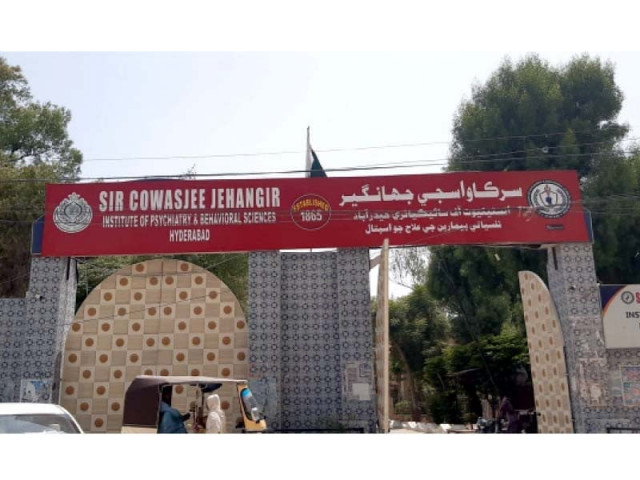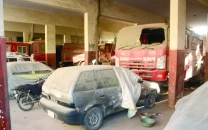Sindh's largest mental health hospital struggles
Health services at Sir Cowasjee Jehangir Institute crippled by vacant posts, underfunding

The proper functioning of Sindh's largest mental health care facility, which even serves patients from South Punjab and Balochistan, remains handicapped due to shortage of doctors and staff.
Some other funding woes of Sir Cowasjee Jehangir Institute of Psychiatry and Behavioral Sciences, aka Giddu hospital in Hyderabad, also surfaced during the recent visit of the Sindh Human Rights Commission's Chairman Iqbal Ahmed Detho.
Although the Sindh government has earmarked Rs651 million for the hospital, including Rs377 component for salaries and allowances of employees, the 500-beded hospital is confronted with severe staff shortage. "There are 12 operational wards but we are coping with a crisis of not being able to run the facility 24/7," a senior officer, who requested anonymity, told The Express Tribune.
According to him, there are six posts of psychiatrists but five of them are vacant. Likewise, the sanctioned strength of the lower staff is 225 but 92 of these posts are also vacant. On the day of the visit on June 26 some 313 out of the 500 beds were occupied, according to Medical Superintendent Dr Nisar Ahmed Soho.
The recently built ward number five with its 200 beds is expected to see its inauguration in August. "Even if it is inaugurated, how can we run it with the staff scarcity," the officer said.
The budget 2025-26 has set aside slightly over Rs90 million for the institute's medicines and Rs78 million for patients' meals. But both the allocations, according to the hospital's officers, fall short of their actual expenditures.
"Last year we received around Rs65 million for medicines and about Rs30 million from that amount was spent on epilepsy medicines alone," the source claimed, pointing out that the health condition technically fell under the domain of neurology and not mental health services. "Yet we have to provide services to thousands of epilepsy patients because it has been the norm for decades."
The provincial government provides Rs270 per meal per patient with an annual allocation of Rs78 million for the upcoming fiscal. However, the institute needs Rs147.825 million for a three-time meal per year in view of the 500 beds, notwithstanding the addition of 200 more beds.
The substance abuse in the society is increasing alarmingly but the institute's 50-bed narcotics rehab ward is also not fully functional, reportedly. A doctor, who also wanted to remain anonymous, claimed that in view of the cases requiring admission for rehab, the ward's capacity is too low.
The infrastructure repair and maintenance works have also become a bane for the administration. The facility is dependent on the Provincial Buildings Department for such works. In March this year, the MS wrote separate letters to the department for repair works in washrooms and to fix leakage in the water tank.
"... this office is unable to carry out any work without funds. When the funds are available the work will be carried out," the department's executive engineer replied to the MS, repeating the same excuse in both his correspondences.
Referring to these issues, the SHRC's Chairman underscored that institutional coordination is indispensable "to mitigate vulnerabilities faced by individuals with mental illnesses". Detho suggested that a committee should be formed to address the persistent gaps.

























COMMENTS
Comments are moderated and generally will be posted if they are on-topic and not abusive.
For more information, please see our Comments FAQ